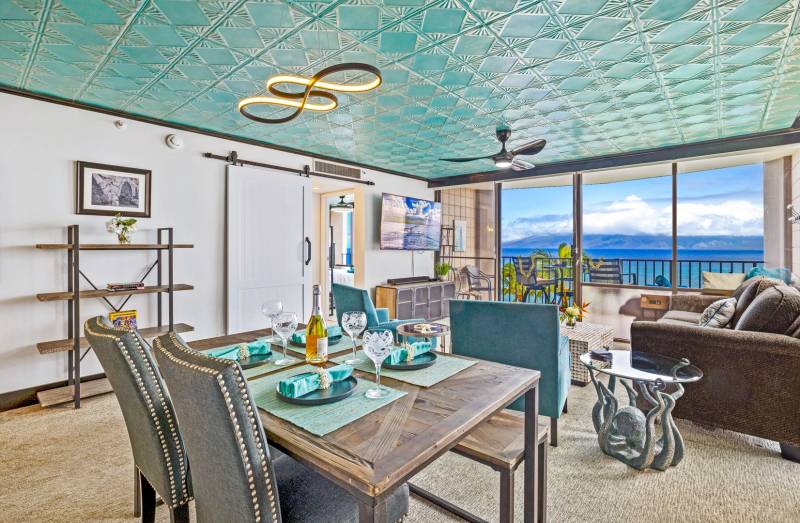Properly Transition a Hawaii Vacation Rental Property During a Purchase Part 2
You’ve got your dream investment property in escrow, are all set to close on your Hawaii Vacation Rental Property, and have followed my advice in Part of 1 of how to Properly Transition a Hawaii Vacation Rental Property During a Purchase Part 1.
Now what?
I recommend that all of the below steps be taken after you have hired professional management representation or have made the decision to manage the property yourself. This post is not meant to be pretty but rather informative so I will make some plugs on my vacation rental inventory for eye candy throughout and they also pertain to the subject matter at hand.

Welcome to one of our newest vacation rental offerings. My team and I just recently took over this property which just sold in March of 2022 and the owner was having a poor experience with the large local management company she just hired. I am very pleased with our swift transition of this property into our program and also in every sense of the word, grateful, for the high level of cooperation and professionalism that the previous management company has shown throughout this process in return. We don’t win or keep them all but grace speaks for itself.
N-2 Details of the Purchase Contract in Writing
This is pertinent during the contract drafting process to spell out the specifics of how N-2 (see part 1 of blog post) will be handled with bookings, property review transfers, the specifics of guest information provided as it is not properly covered under the default language of section N-2 or any other section of the Hawaii purchase contract. This specific shortfall can be overcome by having your agent write a special term in the contract relating to N-2.
Additionally, if this is not handled on the front end or there is any other material decision made by either party- it is paramount to get this information in writing by means of a contractual amendment to the purchase contract. I recently dealt with a property that was referred by another broker to my team where the seller agreed multiple times albeit not in writing to transfer the reviews on the property post closing but after closing on the property, changed their mind and decided not to. This has created quite the challenging situation for my team to have to deal with our disgruntled new owner client.
Understanding Previous Contractual Terms of the Prior Rental Agreements
Also covered under section N-2 of the purchase contract are the contracts that are used between the sellers and the renters directly (if self-managed) or the management company and the renters. In order to create goodwill and ingratiate yourselves with the renters of the property, I believe it is wise to follow the contractual terms of their prior agreement as closely as possible. This can be especially challenging right now during the Covid-19 Pandemic as guests are looking for very lenient cancellation policies and payment terms. Grace and flexibility with the guest is important but so is drawing the line of what is ethical, reasonable, and makes business sense.
We have had to walk away from potential renters who were not willing to leave a hard deposit with us in the past and when considering deposits usually range from $500-$1,000 for properties that are selling for what they are, it seems reasonable that you will not want to take on some of these.
It is to be expected that there will be attrition with reservations on this property as some people especially right now are looking for any reason that they can to get out of their rental agreements.

This gorgeous and designer-finished two-bedroom panoramic ocean and outer island view condo is set to close at the end of this month and will be immediately ready for rental in our program starting in early May. Be sure to visit our portfolio page here and search for Wailea Ekolu #1106 to secure your stay today.
Transferring Reservations from Existing management Company to New One
My first piece of advice here is that if the current management company is doing truly a great job or they are meeting your goals, you may want to strongly consider not making a change here. If the operation leaves much to be desired as oftentimes is the case, it is likely best to cut the ties at the point of sale. Fortunately, you as a buyer or a seller in a transaction don’t have to be concerned with too many of the intricate parts and effort involved in this process but the end results do have serious consequences.
Many management companies have clauses in their management contracts that state that they will earn their full fee for any reservations that they have on the books until the point of where they are instructed to stop booking the property. What happens in actuality is that in the instance that a change is being made on the management front, the existing company and the new company set to take over will negotiate terms between each other. Generally a commission is paid to the existing company for their booking and then the new company takes over the reservation and manages the rest of the process for the remainder of the fee that was collected as part of the total management fee that the seller was paying.
I have seen instances where the existing management company gets sour and reservations “disappear” off the books or they are just very blatant in their position to move them to another property. In my own professional practice, I find this disgusting and completely unethical as I have been on both sides of this process. It is a very small island and we have to treat each other right.
One of my friends and colleagues at Hawaii Life, Mary Kerstulovich just recently represented her buyer client with a 1031 Tax Deferred Exchange to close on this incredible ocean view condo at Kapalua Ridge #321. Our design team has worked feverishly with the new owner to transform the property as quickly as possible to capture immediate rental activity.
Strong Communication with Seller or Current Management Company
Prior to the transfer of management on the property, it is paramount that there be strong communication with the owner and their seller’s rep directly if they are self-booking the property or their management company if they have professional management. Getting a solid understanding of how everything will work in advance of closing will make the process so much more seamless so that there are not moments of panic on the day of closing which should be a day of celebration rather than frustration.
Again, I highly recommend that all the decisions being made be affirmed in writing so that there is no ambiguity at a later time.
Transferring Deposit Funds or Pre-paid Reservation Revenue Through Escrow at the Point of Sale
As part of the aforementioned N-2 process, the contract will stipulate that all pre-paid deposits or paid in full revenue is to be pro-rated as of the date of closing and transferred from the seller to the buyer. With this, I highly recommend that all of these funds be held by escrow rather than having anything disbursed through the closing process that would appear on the buyer’s closing statement by means of a credit against any down payment funds or total cash funds required to close. If this is not done, it can really muddle the accounting and the buyer will need to transfer the funds back to the new management company where the following would be deducted: cleaning fees, resort fees, taxes, and management fees.
I recently dealt with a property referred to us where the accounting of the assumed/transferred reservations was an absolute mess in that there was zero break down on the nightly rate, taxes collected, and a daily rate. All that was presented was a lump sum of funds that was transferred through escrow (fortunately we were able to catch this in time before it was sent to the buyer directly) that we had to create all of the essential allocations of each one of these categories — not fun!
When does it make sense to mark section N-1 of the Purchase Contract?
It makes sense to elect to check this scenario under the following scenarios:
- For a property that is zoned for vacation rentals but the property is not currently being rented.
- You as a buyer do not want any binding reservations or other contracts bound to the property as part of your purchase.
- You know that you plan to change management companies from a front desk rental entity to either self managed or independently managed operation. The reason for this specific scenario is that front desk rental entities very rarely rent specific units. Rather, they rent categories or classifications of properties and thus if the property is not staying in their program- they will simply shift any interested guests to a different property that remains in their program within the same classification.




Leave your opinion here. Please be nice. Your Email address will be kept private, this form is secure and we never spam you.